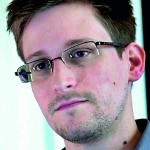Sunday Times 2
Snowden and the Pope
NEW YORK – Pope Francis increasingly resembles a gust of fresh air blowing through the musty chambers of the Catholic Church. He looks and behaves like a normal human being. He wears shoes instead of red velvet slippers. He has good taste in books: Dostoevsky, Cervantes. And he has a more humane attitude toward homosexuals, even if he has not opposed church doctrine on sexual behavior.
But the most astonishing thing that Francis has said, in a recent letter to the Italian newspaper La Repubblica, concerns non-believers.

Pope Francis
A non-believer is safe from the fires of Hell, the pope assures us, as long as the non-believer listens to his or her own conscience. These are his exact words: “Listening [to] and obeying [one's conscience] means deciding about what is perceived to be good or to be evil.”
In other words, neither God nor the Church is really needed to tell us how to behave. Our conscience is enough. Even devout Protestants would not go that far. Protestants only cut out the priests as conduits between an individual and his maker. But Francis’s words suggest that it might be a legitimate option to cut out God Himself.
The Catholic Church would not have survived for as long as it has if it had not been prepared to change with the times. The Pope’s statement certainly is in accord with the extreme individualism of our age. But it is nonetheless a little puzzling. After all, a Christian believer, as the Pope must be, would have to assume that questions of good and evil, and how to behave ethically, are prescribed by church doctrine and holy texts. Christians believe that their views of right and wrong are sacred and universal, and that morality is a collective pursuit.
I do not know whether Edward J. Snowden, the American former intelligence contractor who exposed official secrets in protest against his government’s snooping on its citizens, is a Christian. Perhaps he is an atheist. Either way, he fits perfectly the new pope’s view of the moral person. Snowden claims that he acted according to his conscience, to protect “basic liberties for people around the world.” His view of the collective good was entirely individual.
Perhaps in a secular age ethical behavior has no other basis than one’s own conscience. If sacred texts can no longer tells us the difference between good and evil, we will have to decide for ourselves. Liberal democracy cannot provide the answer; nor does it pretend that it can. It is no more than a political system designed to resolve conflicts of interests lawfully and peacefully. Questions about morality and the meaning of life lie outside its scope.

Edward Snowden
But democratic politics can be, and often is, strongly influenced by religious beliefs. Most European countries have Christian-democratic political parties. Israel has its Orthodox parties. American politics is saturated by Christian doctrine and symbols, especially — but by no means exclusively — on the right. Muslims are trying to inject their faith into politics, often in illiberal ways.
Then there are the secular political ideologies, such as socialism, which have a strong ethical component. Socialist and communist parties, no less than the Catholic Church, have firm views on right and wrong, and on what the collective good should be. Indeed, social democracy in many countries is rooted in Christianity.
And yet, despite the huge victory won by German Chancellor Angela Merkel’s Christian Democrats in Germany’s recent election, Christianity is a fast-vanishing force in European politics. And left-wing parties’ influence is vanishing even faster. Most of what remained of socialist ideology was washed away in the late 1980s with the collapse of the Soviet empire.
What has emerged since the social upheavals of the 1960s and the financial “Big Bangs” of the 1980s is a new type of liberalism that not only lacks a clear moral basis, but also regards most government restraints as attacks on individual freedom. In many respects, we are no longer citizens, but consumers. Former Italian Prime Minister Silvio Berlusconi’s unrestrained behavior, both personal and financial, made him the perfect politician for the neo-liberal age.
Might there be new ways to establish a moral basis for our collective behavior? Some utopians believe that the Internet will do so by creating space for new citizen networks to transform the world. In the sense that social media can be used to mobilise people for good causes, there is some truth to this. Thousands of Chinese idealists, inspired by bloggers and social media, helped their fellow citizens after a recent earthquake, even as their government was suppressing the news.
But the Internet is, in fact, pushing us in the opposite direction. It encourages us to become narcissistic consumers, expressing our “likes” and sharing every detail of our individual lives without truly connecting with anyone. This is no basis for finding new ways to define good and evil or to establish collective meanings and purposes.
All the Internet has done is make it easier for commercial enterprises to compile huge databases on our lives, thoughts, and desires. Big business then passes this information on to big government. And that is why Snowden’s conscience drove him to share government secrets with us all.
Perhaps he did us a favour. But I cannot imagine that he is quite whom Pope Francis had in mind when he was trying to bridge the gap between his faith and our age of unbound individualism.
Ian Buruma is Professor of Democracy, Human Rights, and Journalism at Bard College, and the author of Year Zero: A History of 1945.
Copyright: Project Syndicate, 2013.Exclusive to the Sunday Times
www.project-syndicate.org

